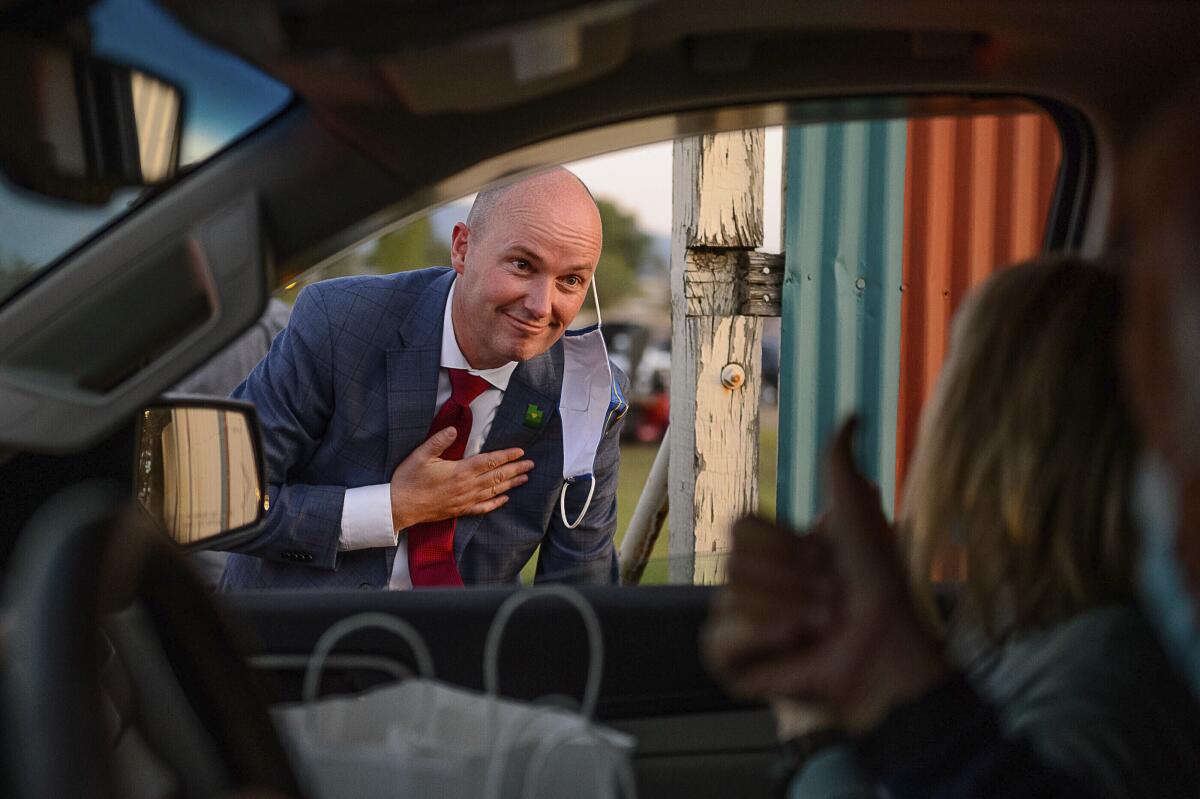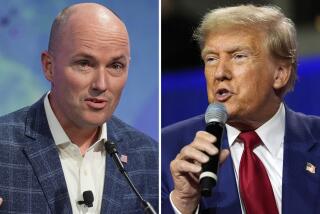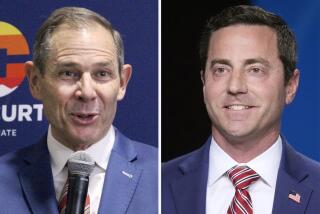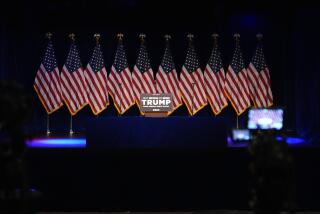Spencer Cox bests ex-ambassador Jon Huntsman in Utah governor race

- Share via
SALT LAKE CITY — Spencer Cox won the Republican nomination for Utah governor Monday, as the lieutenant governor successfully staved off a comeback attempt by former U.S. Ambassador Jon Huntsman Jr.
Cox’s primary win gives him a heavy advantage in the conservative state’s general election in November.
The four-way race came down to Huntsman and Cox, who clinched a narrow win after days of vote counting. Huntsman is a former governor, former ambassador to Russia and one-time presidential candidate. Cox has been a rare conservative critic of President Trump, though he now supports him.
Cox started his gubernatorial campaign sooner and his visibility was boosted by his leadership role in responding to the state’s COVID-19 pandemic. He was also endorsed by incumbent Republican Gov. Gary Herbert, who isn’t running again.
“The next four years will be critically important to Utah’s future,” Cox said Monday, referring to the rebuilding of the state’s economy hit hard by the pandemic and growth in both rural and urban parts of the state.
Cox referred to himself as a “farm kid,” a reflection of how he leaned on his rural roots during the campaign and used his head start to cross the state, stopping at nearly every small town before the coronavirus hit.
The election was conducted entirely by mail due to the pandemic. The crisis shaped the campaign, which included Huntsman testing positive for the disease.
The new GOP nominee will run against Democratic law professor Chris Peterson in November.
The pandemic stymied traditional campaigning, especially for Huntsman, who caught the virus in June. He continued rallying supporters remotely, and got back on the trail after a quarantine and recovery.
“This was anything but a typical campaign season, with the COVID-19 pandemic making impossible our ability to meet face-to-face with more of the people in communities across our state,” Huntsman said while conceding the race. “Public service is in our blood and whatever our next chapter may hold, I am confident we will find a way to continue to contribute to the good of our community.”
He had faced questions during the campaign about why he was returning to the state and had to promise to serve out a full term even if a higher profile opportunity arose. His previous stint as governor ended in 2009, when then-President Obama named him ambassador to China. He mounted a short-lived presidential run during the 2012 cycle before serving as envoy to Russia under Trump.
Huntsman, 60, has one of the most well-known names in Utah, where buildings are named for his billionaire industrialist and philanthropist father Jon Huntsman Sr.
Cox, 44, is a political newcomer by comparison, having been first elected to statewide office in 2012 and named the state’s second-in-command the following year.
For Cox, the coronavirus crisis created both a spotlight and a target. His role in the state response put him in front of voters concerned about the virus and stuck at home during a shelter-in-place directive, but it also opened him up for criticism from the right as the strong state economy took a hit along with the rest of the world.
The state’s pandemic response came under criticism from former House Speaker Greg Hughes, a vocal supporter of Trump who railed against business shutdowns, and real estate executive Thomas Wright.
The race saw an unusual number of liberal-leaning and independent voters crossing party lines and registering as Republicans to vote in the primary. Most said it was the best way to have a voice in a state where the GOP dominates politics. Huntsman was seen as the candidate most likely to benefit from the crossover vote, though Cox is also considered more moderate.
Many Utah conservatives, meanwhile, haven’t been as warm in their embrace of Trump, whose bombastic style has never meshed well with the state’s polite, immigrant-welcoming sensibilities.
Leaders also support mail-in voting. Utah voters have cast most of their ballots by mail for years, and it’s generally been credited with being cheaper for counties to run while increasing turnout. It does typically take longer to tally by-mail ballots due to extra security procedures, and this year those were further delayed by a 24-hour ballot quarantine.
During the June 30 election, the state became one of a very few that did not open any polling places. The step was temporary due to the pandemic. Voters could pick up, fill out and drop off mail-in ballots at “drive-through” voting centers, but the state did not run any traditional in-person voting.
More to Read
Get the L.A. Times Politics newsletter
Deeply reported insights into legislation, politics and policy from Sacramento, Washington and beyond. In your inbox three times per week.
You may occasionally receive promotional content from the Los Angeles Times.










